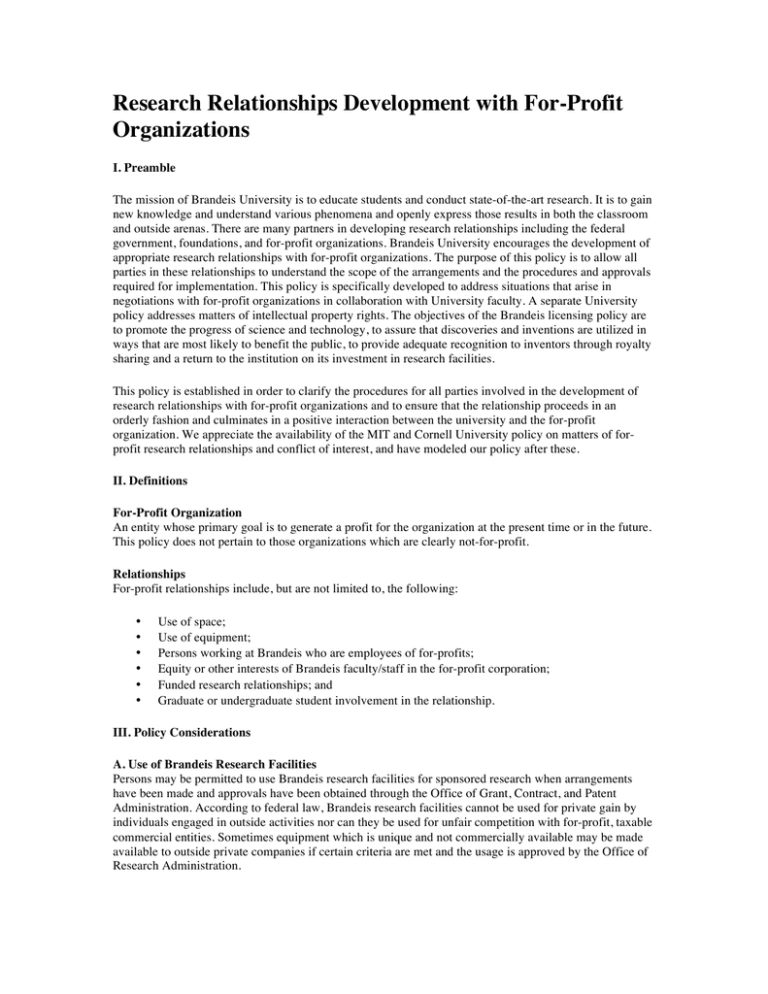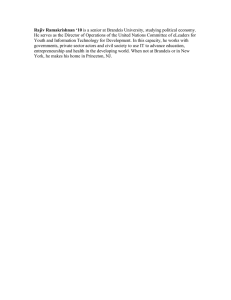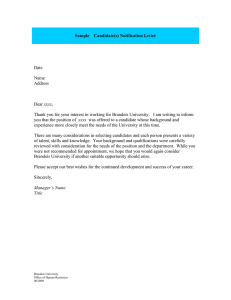Research Relationships Development with For-Profit Organizations
advertisement

Research Relationships Development with For-Profit Organizations I. Preamble The mission of Brandeis University is to educate students and conduct state-of-the-art research. It is to gain new knowledge and understand various phenomena and openly express those results in both the classroom and outside arenas. There are many partners in developing research relationships including the federal government, foundations, and for-profit organizations. Brandeis University encourages the development of appropriate research relationships with for-profit organizations. The purpose of this policy is to allow all parties in these relationships to understand the scope of the arrangements and the procedures and approvals required for implementation. This policy is specifically developed to address situations that arise in negotiations with for-profit organizations in collaboration with University faculty. A separate University policy addresses matters of intellectual property rights. The objectives of the Brandeis licensing policy are to promote the progress of science and technology, to assure that discoveries and inventions are utilized in ways that are most likely to benefit the public, to provide adequate recognition to inventors through royalty sharing and a return to the institution on its investment in research facilities. This policy is established in order to clarify the procedures for all parties involved in the development of research relationships with for-profit organizations and to ensure that the relationship proceeds in an orderly fashion and culminates in a positive interaction between the university and the for-profit organization. We appreciate the availability of the MIT and Cornell University policy on matters of forprofit research relationships and conflict of interest, and have modeled our policy after these. II. Definitions For-Profit Organization An entity whose primary goal is to generate a profit for the organization at the present time or in the future. This policy does not pertain to those organizations which are clearly not-for-profit. Relationships For-profit relationships include, but are not limited to, the following: • • • • • • Use of space; Use of equipment; Persons working at Brandeis who are employees of for-profits; Equity or other interests of Brandeis faculty/staff in the for-profit corporation; Funded research relationships; and Graduate or undergraduate student involvement in the relationship. III. Policy Considerations A. Use of Brandeis Research Facilities Persons may be permitted to use Brandeis research facilities for sponsored research when arrangements have been made and approvals have been obtained through the Office of Grant, Contract, and Patent Administration. According to federal law, Brandeis research facilities cannot be used for private gain by individuals engaged in outside activities nor can they be used for unfair competition with for-profit, taxable commercial entities. Sometimes equipment which is unique and not commercially available may be made available to outside private companies if certain criteria are met and the usage is approved by the Office of Research Administration. B. Appropriate Research In order to support the mission described in the preamble of this document, any research conducted on the Brandeis University campus should be limited to the intellectual interests of the Brandeis faculty and senior research staff and the responsibility for that research must reside with the principal investigator. The research should be driven by the advancement of knowledge and should, where possible, provide both thesis or dissertation opportunities for students. Under federal law applicable to tax-exempt institutions, research must be related to educational objectives of the university. The conduct of unrelated activities may result in the imposition of a tax on the University and, if found to be significant, a loss of the University's tax-exempt status. A tax-exempt institution may not engage in commercial activities such as product development or routine testing unless an appropriate and separate administrative structure is established and the required procedures developed. This does not necessarily include the fabrication of conceptual models and lab prototypes. For example, start-up companies on the campus involving a Brandeis faculty member would be allowed to develop conceptual models and/or lab prototypes. If the research were to go beyond that stage into commercialization, then it would no longer be appropriate for university space to be utilized. C. Contract Policies The following contract policies applicable to Brandeis research agreements with industrial sponsors are of particular significance. 1. 2. 3. 4. 5. 6. Best Efforts: Since state-of-the-art research is, by nature, unpredictable and without guarantees of success, Brandeis research is conducted on the best effort basis. The University receives no fee or profit on its research with which to cover business risk. Therefore, Brandeis cannot accept contract provisions which impose penalties for failure to complete the statement of work within the estimated cost, or provide for the withholding of payment if the sponsor is not satisfied with the results. Brandeis cannot be held liable for any research which leads to product development and, therefore, disclaims any liability with regard to commercial products or service that arise from research conducted at Brandeis University. 2. Conflicting Obligations: Brandeis University does not enter into research agreements where there are conflicting obligations or conflict of interest between parties. Full disclosure of any potential conflicts is necessary. Brandeis employees must adhere to the policies stated in the current Conflict of Interest statement. Normally, Brandeis employees should not hold equity interest or an option for an equity interest in a for-profit organization which will (1) occupy research space on the campus; (2) locate its employees in a Brandeis research space; (3) utilize University equipment; or (4) have a funded research agreement with a Brandeis employee. Startup companies where one or more of the principals is a Brandeis faculty member and where no commercialization of a product has begun will be considered separately. 3. Publications: Brandeis research must be disseminated on a non-discriminatory basis and openly published. Companies may have the right to review proposed publications up to 60 days before submission for publication for the purpose of review for patentable material but may not prohibit nor delay publication. We cannot undertake studies when the results cannot be freely published. 4. Students: It is expected that at times graduate and/or undergraduate students may participate in research and be supported by funds provided by for-profit corporations. There will be no restrictions with regard to publication, confidentiality, choice of research projects or thesis topic. 5. Intellectual Property: Brandeis University retains all ownership of inventions, tangible research property, and copyrightable materials, including the software resulting from sponsored research and licenses them, in the public interest, under an active Technology transfer Program in which the licensing of industrial research sponsors is an important part. A separate policy concerning all intellectual property and the sharing of return is provided by the Office of Research Administration. 6. Cost Reimbursement: Brandeis conducts research only on the basis of full-cost reimbursement. Such research must be funded in advance since the institution does not have adequate funds to finance work in progress or to pay the interest on funds borrowed for that purpose. IV. Implementation Procedures The beginnings of any discussion should take place between the Director of the Office of Research Administration and representatives of the faculty and the for-profit organization. The Director will communicate with the following individuals as required: the President, when necessary; the Provost and Senior Vice President for Academic Affairs, the Executive Vice President for Finance and Administration, the Associate Provost, the Dean of Arts and Sciences or the Dean of the Heller School, University Legal Counsel, the Controller, the Vice President for Administration, Department Chairs, and center Directors. Such communication will allow all parties to be aware of potential interactions with our employees and forprofit organizations. 1. 2. 3. 4. 5. Space: At times, for-profit organizations may propose to use research space on the Brandeis University campus. It may be appropriate for Brandeis to rent space to for-profit organizations when research considered by the for-profit overlaps with research at the University and when application is made for an available part of a laboratory or an entire laboratory becomes available for a defined period of time. So that rental agreements are within the policy guidelines of the institution, the agreement should be initiated by the Director of the Office of Research Administration and reviewed both by the Executive Vice President for Finance and Administration (who will determine whether the space can be rented to an outside party) and secondly, by the Controller (who will determine the impact on the indirect cost base to the institution). The decision to grant use of the space will be determined by the above criteria and the relevance to University research interests. Any use of space should be delineated in a formal space rental agreement defining the rate per square foot, the period of time, insurance requirements, liability requirements, and clearly stating that Brandeis University does not indemnify any group for the use of space on the Brandeis University campus. Any funds accrued to the University for use of space will be allocated to the general fund pool. Equipment: Because of the specialty of instrumentation and equipment, for-profit organizations may apply to use equipment on campus. Such equipment usage, when used by for-profit organizations, should be detailed in a specific agreement and reviewed by the Controller in conjunction with the Office of Research Administration. Any funds that accrue to the University would accrue to the maintenance and support of the equipment and, above that, would revert back to general funds. Employees, For-Profit: On occasion for-profit employees may seek to be located on the Brandeis campus. This can occur in a number of ways. A guest appointment may be made where the courtesy is extended to a for-profit employee to participate with Brandeis University faculty for a period of time on a research project. For-profit employees will be given a guest appointment through the Office of the Provost and Senior Vice President for Academic Affairs and will adhere to all regulations and policies of the institution. These people are usually not paid through the University. For-profit employees may apply to use space on the campus on a pay-as-you-go basis and have a research relationship with a faculty member here. The major criteria for allowing use of space is that the for-profit employee carries on research of interest to the company with a mutual interest to the faculty members involved in similar research at the University. In this instance, the space is rented for a period of time and the employees must be covered by all aspects of a formal research agreement concerning use of space, equipment, and liability for the individuals involved. Research: Any kind of interaction with for-profit corporations should begin with a research funding agreement similar to the model shown in Attachment 1, defining agreed-upon terms and conditions. This agreement should be drafted by the Director of the Office of Research Administration and should be signed off by this office. Various constituencies would be consulted prior to execution of the agreement as required with regard to space, equipment, and for-profit employees. No research can begin prior to execution of a formal agreement. Financial Arrangements and Type of Funding: The Office of Research Administration will determine, along with the Controller, the appropriate arrangements for the funding of various interactions with for-profit corporations whether it be space, equipment usage, research support, 6. 7. student support, etc. All financial considerations will be set forth in an agreement indicating the responsibilities of all parties involved and the distribution of resources. Disclosures: Before any research agreement is signed or any other agreement is reached with regard to interactions with for-profit corporations a complete disclosure of all parties involved will be made with regard to financial or other interests in the for-profit, either current, past, or anticipated for the future. Procedures and Approvals: We expect that a formal research agreement will be signed as shown in Attachment 1 before any active interaction between Brandeis University and a for-profit organization commences. The agreement will be signed by the Director of the Office of Research Administration. Any appeals of the process or decisions will be made to the Provost and Senior Vice President for Academic Affairs.




